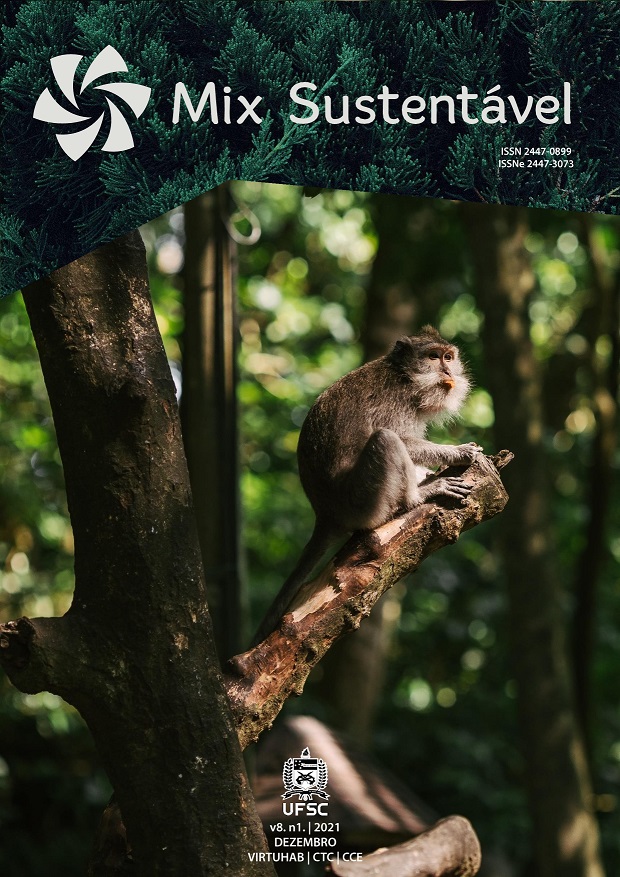ANALYSIS OF THE REVERSE LOGISTICS OF RESIDUAL VEGETABLE OIL IN THE CITY OF TERESINA (PI)
DOI:
https://doi.org/10.29183/2447-3073.MIX2022.v8.n1.133-143Keywords:
Reverse logistic, Residual frying oil, Recycling, Sustainability, CollectAbstract
Residual vegetable oil represents a serious environmental risk when discarded in drains, sinks, soil or water bodies. However, it has great potential as a raw material in the manufacture of other products, such as: soap, biodiesel, cosmetics, cleaning products, paints, animal feed and others. In this way, it is very important to apply reverse logistics, that is, used frying oil collection processes, allocating it to new production cycles. Therefore, the article in question intended to carry out an analysis of the procedures necessary for the application of reverse logistics of this waste in the city of Teresina (PI). For this, semi-structured interviews with were made if companies specialized in carrying out the collection and proper disposal of oil were applied. So, it was possible to verify how the chain is coordinated and structured, advantages in environmental, social and economic aspects, particularities of this system, such as the underutilization of storage capacity in these companies, as well as difficulties such as the lack of environmental education by society and government support.References
BISCARO, M. A. S.; FERNANDES, T. B.; PINTO, F. R.; ALENCAR, D. B.; PARENTE, R. S. Feasibility of Frying Oil After Treatment by a Biofuel Company in Manaus - Amazonas. Jornal Internacional para Educação e Pesquisa em Inovação www.ijier.net Vol: -7 No-11, Editora e Fundação Internacional de Pesquisa Educativa, 2019.
BRASIL. Lei nº 12.305, de 2 de agosto de 2010. Institui a Política Nacional de Resíduos Sólidos; altera a Lei no 9.605, de 12 de fevereiro de 1998; e dá outras providências. Brasília, DF, 2010. Disponível em: <http://www2.mma.gov.br/port/conama/legiabre.cfm?codlegi=636>; Acesso em: Jan, 2021.
BRASIL. Ministério da Saúde. Agência Nacional de Vigilância Sanitária – Anvisa. Resolução RDC n° 216, de 15 de setembro de 2004. Dispõe sobre o Regulamento Técnico de Boas Práticas para Serviços de Alimentação. Diário Oficial da União, Poder Executivo, Brasília, DF, 16 set. 2004.
BEZERRA, J. A. C.; ROCHA, G. M.; OLIVEIRA, D. R. C. A utilização do óleo comestível pós-consumo em Manaus (AM): alternativa para a produção de biodiesel e redução de impactos ambientai ITEGAM - JETIA Vol. 02, No.07, setembro de 2016, Manaus, Amazonas, Brasil. ISSN 2447-0228 (ONLINE). DOI: https://dx.doi.org/10.5935/2447-0228.20160029
BRUNHARA, J. P. C.; COLARES-SANTOS, L.; NETO, A. C. J. Logística reversa do óleo de fritura usado. V Simpósio Nacional de Gerenciamento de Cidades, 3ª Semana de Arquitetura e urbanismo da UNIVAG, Várzea Grande - MT, 2017.
CRUZ, A. A. P.; FERREIRA, A. P. P.; PRADO, R. C.; MELLO, D. A. A logística reversa do óleo de cozinha como ferramenta de sustentabilidade. XI Simpósio Nacional de Tecnologia em Agronegócio, ANAIS SINTAGRO, Ourinhos-SP, v. 11, n.1, p. 11-20, 22 e 23 out. 2019.
DE OLIVEIRA, R. B.; RUIZ, M. S.; GABRIEL, M. L. D. S.; STRUFFALDI, A. Sustentabilidade Ambiental e Logística Reversa: Análise das Redes de Reciclagem de Óleo de Cozinha na Região Metropolitana de São Paulo. Rio de Janeiro, ano 14, v.18, n.2, p.115-132, 2014.
FERREIRA, L. S.; CÉSAR, A. S.; CONEJERO, M. A.; GUABIROBA, R. C. S. A Voluntary Delivery Point in Reverse Supply Chain for Waste Cooking Oil: An Action Plan for articipation of a Public-School in the State of Rio De Janeiro, Brazil. Recycling 2018, 3, 48.
FIN, E.; TREVISAN, T.; TODESCINI, C.; DOMINGOS, A. F.; HAAG, R. Sustentabilidade na administração pública: programa de reaproveitamento de óleo residual de fritura para produção. 1° Congresso Sul-Americano de Resíduos Sólidos e Sustentabilidade, CONRESOL, Gramado-RS, 2018.
LUMARA; BARROS; C. S.; PARENTE, L. S.; ANDRADE, M. V. F.; BEZERRA, E. P. Destinação do resíduo de óleo de cozinha usado de lanchonetes na cidade de Forquilha-CE. XX ENGEMA. Encontro Internacional sobre Gestão Empresarial e Meio Ambiente. 2018. ISSN: 2359-1048.
MEDEIROS, B. T.; SANTOS, S. C. C.; FAUSTINO, R. P.; FORMIGONI, M. R. A. A aplicabilidade da logística reversa na reciclagem do óleo vegetal usado. REVISTA FATEC SEBRAE EM DEBATE: Gestão, Tecnologias e Negócios, Vol 05, N 08, Jan - Jun. 2018.
OLIVEIRA, E.F.; MARQUES, G. P.; CAMPOS, E. S.; LIMA, V. S.; CAMPOS, V. G.; MAGALHÃES, M. R. Logistica reversa: importância econômica, social e ambiental. Braz. J. Anim. Environ. Res., Curitiba, v. 3, n. 4, p. 4325-4337, 2020.
PEREIRA, S. C.; BRYTO, K. K. C. A logística reversa do óleo de cozinha como contribuição para redução de impactos ambientais: O caso da empresa Norte Óleo em Santa Izabel do Pará. Revista de Administração e Contabilidade da Faculdade Estácio do Pará – Belém, v. 5, n. 9, p. 87-104, jun 2018, ISSN 2358-1948.
RIBEIRO, L. A.; VASCONCELOS, A.; SANTOS, G. B.; CAMPOS, D. M. Transformação do óleo comestível em sabão artesanal: ferramenta de sensibilização para implantação da coleta seletiva municipal. 2018.
SANTOS, L. P. A.; MARTINAZZO, A. P.; FREITAS, W. K. Atuação dos restaurantes na logística reversa do óleo de cozinha no município de Volta Redonda/RJ. ENGEVISTA, V. 20, n.4, p.589-600, 2018.
SILVA, E. R.; MATTOS, U. A. O.; SANTOS, L. B. Análise da cadeia produtiva da reciclagem do óleo vegetal residual (cidade de Duque de Caxias, Rio de Janeiro, Brasil). O Social em Questão - Ano XXI - nº 40 - Jan a Abr/2018.
ZHOU, X.; ZHOU, Y. (2015). Designing a multi-echelon reverse logistics operation and network: A case study of office paper in Beijing. Resources, Conservation and Recycling, 100, 58–69. doi:10.1016/j.resconrec.2015.04.009
Downloads
Published
How to Cite
Issue
Section
License
Creative Commons Copyright Notice
Attribution 4.0 International




